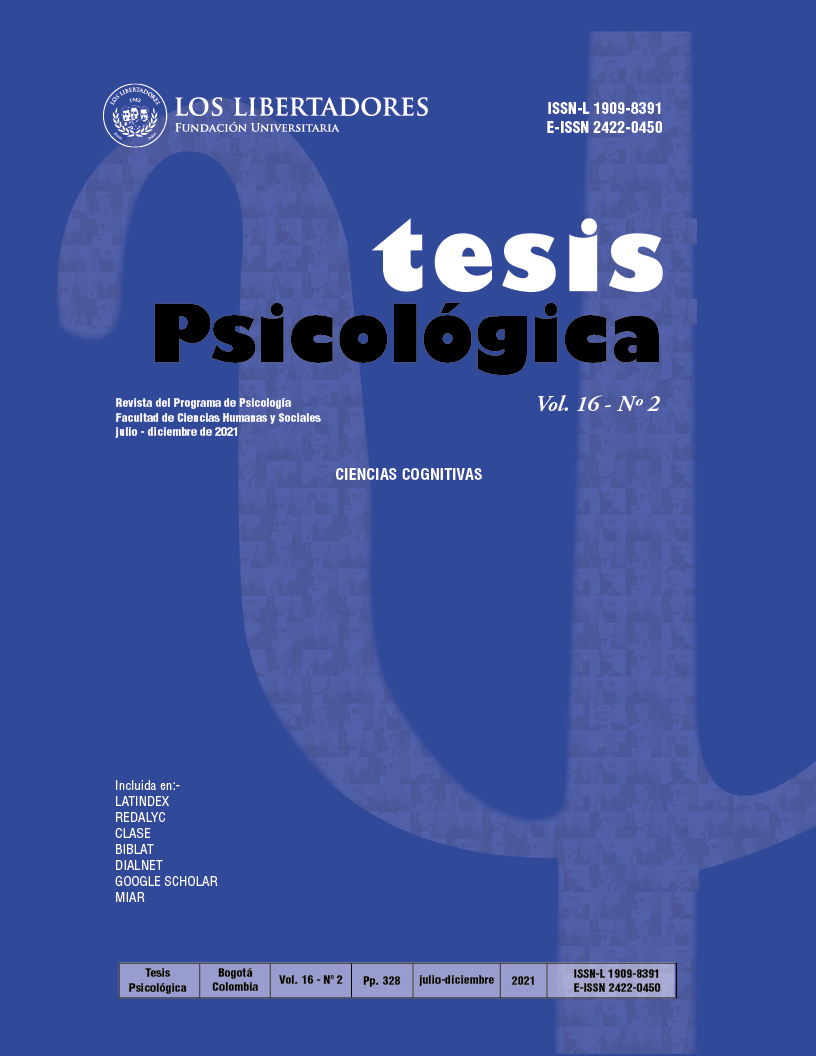Psychosocial diagnosis of a post-conflict territory: the case of Apartadó, Antioquia
DOI:
https://doi.org/10.37511/tesis.v16n2a13Abstract
Background: The article presents a part of the results of the research project: Therapeutic Mediation of the Social Network in a Post-Conflict Context, which developed a collaborative work between University, State, and society on the actions prioritized by the post-conflict ministry in its peace-building axis, in order to guide the meaning of public policies and the relevance of programs and projects of Social Welfare. Objective: To recognize the psychosocial problems present in the territory of Apartadó through a social diagnosis. Methodology: The type of research was community participatory, which seeks to empower and put people into action as actors and supervisors of their own process, being the first unit of observation on the social perception of the problem: magnitude, perceived degree of affectation, needs for future intervention, and affected population groups. The research was carried out with mixed methods of data collection: surveys, interviews, and social mapping. The social actors were 149 people who voluntarily participated in the project through an open call to families, social leaders, community, public, and private institutions. Results and conclusions: The social impact is translated into collective and individual exercises of analysis of social problems, allowing the formulation and prioritization of basic psychosocial care needs from the multidimensional viewpoint of the professionals who lead social development projects.
Downloads
References
Bohleber, W. (2007). Recuerdo, trauma y memoria colectiva: la batalla por la memoria en psicoanálisis. Revista de la Asociación Psicoanalítica de Buenos Aires, 19(1), 43-75. https://www.pep-web.org/document.php?id=apm.050.0105
Congreso de la República de Colombia. (2006, 6 de septiembre). Ley 1090. Por la cual se reglamenta el Código Bioético y Deontológico del Ejercicio de la Psicología. Diario Oficial 46.383. http://www.secretariasenado.gov.co/senado/basedoc/ley_1090_2006.html Cyrulnik, B. (2009). Autobiografía de un espantapájaros. Testimonios de resiliencia: el retorno a la vida. Gedisa.
Durston, J. & Miranda, F. (2002). Experiencias y metodología de la investigación participativa. Cepal. https://repositorio.cepal.org/handle/11362/6023
Featherston, C., Iribe, N. & Mainero, M. (2015). Trauma, Memoria y Relato. Universidad de la Plata. http://sedici.unlp.edu.ar/handle/10915/46095
Hernández, A. (2001). Familia, ciclo vital y psicoterapia sistémica breve. Editorial El Buho.
Hernández, A. (2012). Vínculos, individuación y ecología humana, hacia una psicología clínica compleja. Revista Latinoamericana de Ciencias Sociales, Niñez y Juventud, 10 (1), 687-689. http://ns520666.ip-158-69-118.net/rlcsnj/index.php/Revista-Latinoamericana/article/view/640
Hernández-Sampieri, R. & Torres, C. P. M. (2018). Metodología de la investigación (Vol. 4). McGraw-Hill Interamericana.
Holmes, T. & Rahe, R. (1976). Escala de reajuste social. Journal of Psychosomatic Research, 11(1), 213-218. https://www.redalyc.org/pdf/805/80526204.pdf
Hylton, F. (2020). La horrible noche. El conflicto armado colombiano en perspectiva histórica. Universidad Nacional de Colombia. http://revistaumanizales.cinde.org.co/rlcsnj/index.php/Revista-Latinoamericana/article/view/1985
Lopera, J. & Flórez, A. (2018). Avances y dificultades del proceso de reparación integral a las víctimas del conflicto armado: una mirada al caso de Antioquia. Estudios de Derecho, 74(165), 247-259. https://revistas.udea.edu.co/index.php/red/article/view/334766
Manzanero, A. (2010). Recuerdo de hechos traumáticos: de la introspección al estudio objetivo. Revista de Psicopatología Clínica, Legal y Forense, 10(1), 149-164. https://dialnet.unirioja.es/servlet/articulo?codigo=6384309
Ministerio de Salud de la República de Colombia. (1993, 4 de octubre). Resolución por la cual se establecen las normas científicas, técnicas y administrativas para la investigación en salud. [Resolución N.º 008430]. https://www.minsalud.gov.co/sites/rid/Lists/BibliotecaDigital/RIDE/DE/DIJ/RESOLUCION-8430-DE-1993.PDF
Olson, D., McCubbin, H., Barnes, H., Larsen, A., Muxen, M. & Wilson, M. (1985). Inventarios sobre familia (Edicición revisada). Universidad Santo Tomás.
Olson, D., McCubbin, H., Barnes, H., Larsen, A., Muxen, M. & Wilson, M. (1989). Families: What Makes them Work. Editorial Sage.
Valencia-Suescún, M. I., Ramírez, M., Fajardo, M. A., & OspinA-Alvarado, M. C. (2015). De la afectación a nuevas posibilidades: niñas y niños en el conflicto armado colombiano. RLCSNJ, 13(2),1037-1050. http://revistaumanizales.cinde.org.co/rlcsnj/index.php/Revista-Latinoamericana/article/view/1985
Venegas, R., Gutiérrez, A. & Caicedo, M. (2017). Investigaciones y comprensiones del conflicto armado en Colombia. Salud mental y familia. Universitas Psychologica, 16(3), 277-286. https://web.a.ebscohost.com/abstract?direct=true&profile=ehost&scope=site&authtype=crawler&jrnl=16579267&AN=126370930&h=mrGswna5XAgkp9Q3kSJDjn%2fFB4VcM2dM%2fPOiST8S90y0rmUfyYBGEKY2DuIZfJ2NyaxJOzJeGPI%2bqRBRcHYHSw%3d%3d&crl=c&resultNs=AdminWebAuth&resultLocal=ErrCrlNotAuth&crlhashurl=login.aspx%3fdirect%3dtrue%26profile%3dehost%26scope%3dsite%26authtype%3dcrawler%26jrnl%3d16579267%26AN%3d126370930
Venegas, R., Gutiérrez, A. & Caicedo, M. (2018). Víctimas del conflicto armado en Colombia. Comprensiones sistémicas desde la familia. Editorial de la Fundación Universitaria Los Libertadores. https://repository.libertadores.edu.co/handle/11371/2726
Downloads
Published
Issue
Section
License

This work is licensed under a Licencia Creative Commons Atribución-NoComercial-


